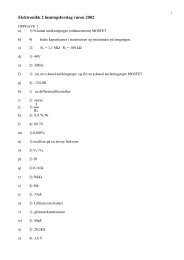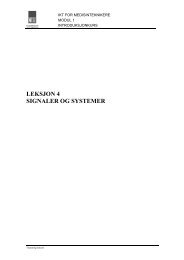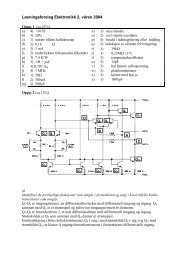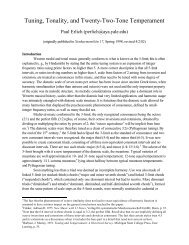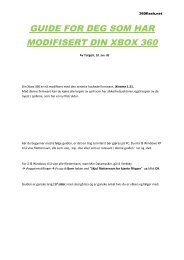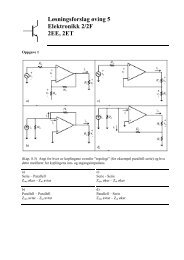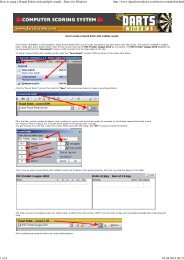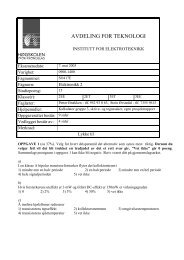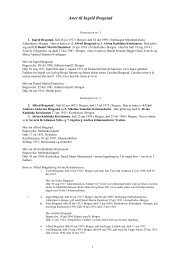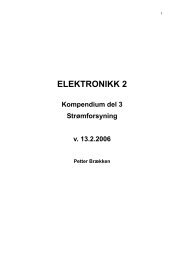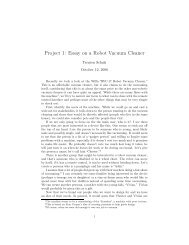The Online World resources handbook
The Online World resources handbook
The Online World resources handbook
You also want an ePaper? Increase the reach of your titles
YUMPU automatically turns print PDFs into web optimized ePapers that Google loves.
Electronic mail, telex, and fax http://home.eunet.no/~presno/bok/7.html<br />
You may be at the receiving end. For more on anonymous mail, check out the<br />
alt.privacy.anon server newsgroup.<br />
<strong>The</strong> files RFC 1113 through 1115 are about 'Privacy enhancements for Internet<br />
electronic mail'.<br />
Usenet has alt.privacy (Privacy issues in cyberspace), alt.security.pgp,<br />
comp.society.privacy, comp.security.pgp.announce, comp.security.pgp.tech,<br />
comp.security.pgp.discuss, comp.security.pgp.<strong>resources</strong>, and more.<br />
Junk mail<br />
Junk mail, also called spam, is one of the curses of modern society. Spam is email<br />
messages that you never asked for, unsolicited commercial mail distributed to many<br />
people simultaneously. Typically, they contain advertising of some product, service,<br />
business, scheme, Web site, etc. Sometimes, such mail promote political ideas.<br />
Junk mail takes time to retrieve, browse, and delete, one by one. It distracts. For<br />
some, it may grow out of proportions, and become a major nuisance. Most users must<br />
pay to receive it, to a local phone company or an Internet service provider.<br />
What to do? If you get on someone's mailing list, you can ask the sender to take<br />
you off that list. This may help a little, but not much! <strong>The</strong>re are too many spammers out<br />
there. Besides, now the unscrupulous sender will know that your address is valid, and<br />
you will undoubtedly received more of the same!<br />
Personally, I delete them, and keep quiet. My communications costs are low, and it<br />
takes too much effort to get off that list.<br />
Others go a long way to protect themselves by being wary of giving out their email<br />
addresses, and of subscribing to newsgroups and mailing lists. However, sadly enough,<br />
the only 100 percent effective method is to close your mail account, and open another<br />
one. <strong>The</strong>n you should safe, but only for a while...<br />
If you're at all active on the net, your address will be picked up by spammers. It's<br />
so easy! Programs like Email Magnet can scan Web sites, newsgroups, and chat<br />
channels to retrieve any string looking like an email address.<br />
When you buy online or ask for information about something, your email address<br />
usually ends up in a database. Many online vendors sell their collection of addresses to<br />
others with information about what browser you are using, the domain you are calling in<br />
from, etc. Others consolidate your data with information from hundreds of other<br />
databases, each having some other bits of information about your use of the net,<br />
preferences, buying habits, etc.<br />
List brokers offer megabytes of lists or CD ROMs full of addresses to anyone<br />
willing to pay. Organizations and individuals offer to send spam mail to names in their<br />
private databases. For a fee, of course.<br />
Filtering is option. Most modern email programs have a filtering function that lets<br />
you automatically send spams to Trash. <strong>The</strong>y'll filter out mail from given senders, and if<br />
they find certain strings in the subject title or the body of the text.<br />
Example: Some dangerious virus distribution schemes are set to send dangerous code in<br />
seemingly empty messages. <strong>The</strong>y exploit a hole in the way .html is being displayed in email<br />
messages.<br />
To delete mails that are obiously hostile, I let my email program (Eudora Pro) search<br />
the body of the incoming mail for the string , and send them<br />
directly to trash.<br />
Another filter searches headers of incoming mails for aol.com (some hostile mails<br />
have this in common), and marks mails containing this string red in the list of incoming<br />
mails. In this way, it is easy for me to delete mails that are evidently unimportant, or if<br />
needed, to investigate their contents in a more careful way.<br />
Finally, consider using non Microsoft email programs like Pegasus Mail or Eudora<br />
Lite (both are free. This will make you less exposed to these risks. Don't open unlikely<br />
looking mail, like a message from the tax man with the subject "I love you". It almost<br />
certainly contains the infamous "I love you" virus. Don't forget that you can get viruses in<br />
attached Microsoft Word documents, too.<br />
Spam stoppers are used to prevent hostile software to pick up your email address from<br />
Usenet newsgroup. A spam stopper is additional characters that makes your address<br />
invalid while making it possible for real users to find out what your real address looks<br />
11 of 20 23.11.2009 15:45



